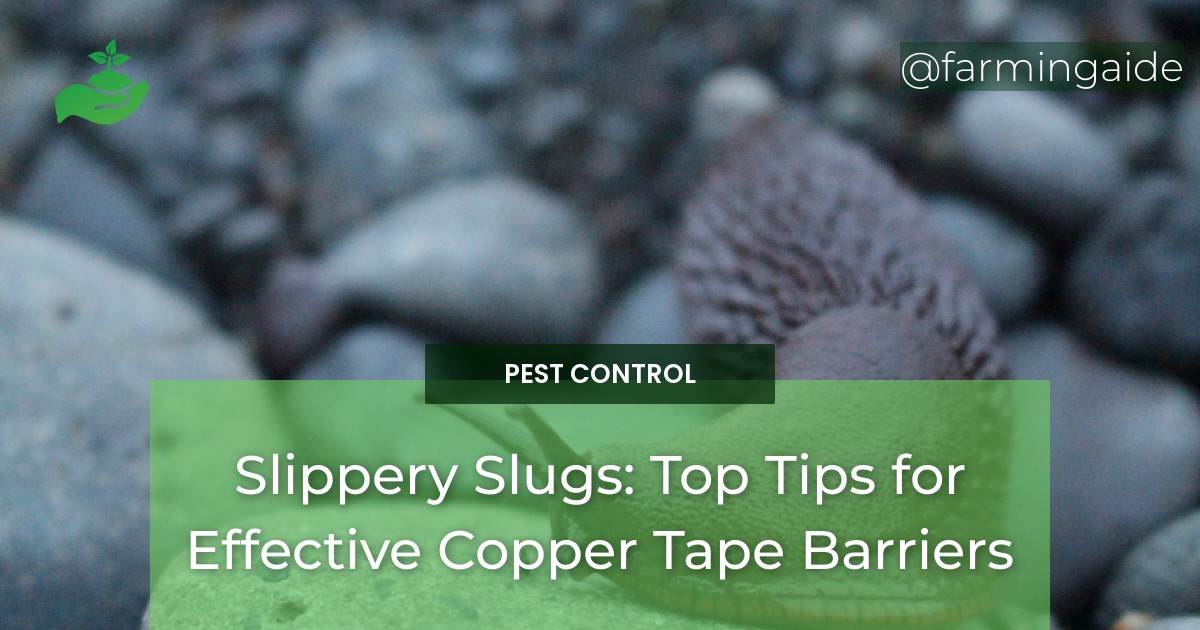Slugs can wreak havoc on your garden, damaging plants and leaving slimy trails behind. To effectively control these garden pests, many gardeners turn to copper tape barriers. Copper tape is a popular method for deterring slugs due to its natural properties and ease of use. In this comprehensive guide, we will explore the top tips for using copper tape barriers to control slugs and protect your plants.
Proper Installation of Copper Tape
Understanding the purpose of copper tape barriers
Before you begin installing copper tape, it’s important to understand why it works as a slug deterrent. Copper tape creates a barrier that slugs find difficult to cross. When slugs come into contact with the copper, it gives them a mild electric shock, deterring them from moving forward.
Choosing the correct copper tape for the job
Not all copper tape is created equal. When selecting copper tape for your slug barriers, look for adhesive-backed tape specifically designed for gardening purposes. This type of tape is weather-resistant and will adhere well to different surfaces, ensuring its effectiveness over time.
Preparing the area for installation
Before applying copper tape, it’s essential to prepare the area properly. Clear away any debris, weeds, or other potential hiding spots for slugs. This will prevent them from finding alternative routes around the barrier.
Applying the copper tape correctly
When applying copper tape, make sure to create a continuous barrier around the desired area. Apply the tape to clean, dry surfaces, ensuring it sticks firmly. Avoid stretching the tape, as it may lose its adhesive properties.
Maintaining the Barrier
Regularly inspecting the copper tape for damage
To ensure the effectiveness of your copper tape barrier, regularly inspect it for any signs of damage. Look out for gaps, tears, or detachment from the surface. These issues can compromise the barrier and allow slugs to enter your garden.
Cleaning the copper tape to ensure effectiveness
Over time, copper tape may accumulate dirt, debris, or oxidation, which can reduce its effectiveness. Clean the tape periodically using a soft cloth or sponge and a mild detergent. This will remove any buildup and restore its conductivity.
Repairing or replacing damaged sections of copper tape
If you notice any damage or wear on the copper tape, it’s important to repair or replace the affected sections promptly. Use adhesive copper tape patches or replace the entire strip if necessary. Maintaining an intact barrier is crucial for slug control.
ALSO READ
Height Above Soil
Determining the appropriate height for copper tape installation
The height at which you install the copper tape barrier can affect its efficacy. Slugs typically crawl along the ground, so placing the tape as close to the soil surface as possible is recommended. This ensures that slugs encounter the tape before reaching your plants.
Adjusting the height for specific plant needs
Some plants may require additional protection, especially those with low-lying leaves or stems. In such cases, consider raising the height of the copper tape barrier. This will create a higher barrier that slugs will find even more challenging to overcome.
Supplementing with Other Methods
Using copper tape in conjunction with slug repellents
Copper tape can be even more effective when used in combination with other slug repellents. Organic options such as diatomaceous earth or crushed eggshells can be sprinkled around plants to create an additional barrier.
Integrating copper tape with natural pest control methods
Consider implementing natural pest control methods alongside copper tape barriers. For instance, encouraging slug-eating predators like frogs, toads, or birds in your garden can help keep slug populations in check.
Exploring additional physical barriers to enhance effectiveness
In areas with high slug activity, you may want to consider using physical barriers in addition to copper tape. Raised beds, cloches, or individual plant collars can provide extra protection and create a more formidable defense against slugs.
Pros and Cons of Copper Tape Barriers
Advantages of using copper tape as a slug deterrent
Copper tape barriers offer several advantages for slug control. They are easy to install, require minimal maintenance, and do not involve the use of harmful chemicals. Copper tape can also be used on various surfaces, such as pots, raised beds, or tree trunks.
Limitations and potential drawbacks of copper tape barriers
While copper tape barriers can be effective, they may not completely eliminate slug problems. Slugs can still find alternative routes or bypass the barrier if it is not properly installed or maintained. Additionally, copper tape barriers may not be suitable for large areas or heavy slug infestations.
Plant Safety Considerations
Ensuring copper tape does not harm or inhibit plant growth
Copper tape is generally safe for most plants when used correctly. However, certain sensitive plant species may show signs of copper toxicity. Monitor your plants for any adverse effects and consider removing the copper tape if necessary.
Addressing potential risks to beneficial insects or wildlife
While copper tape is primarily targeted at slugs, it may also deter other crawling insects. Take care to consider the potential impact on beneficial insects or wildlife in your garden. If necessary, create small openings in the barrier to allow passage for desirable insects.
Conclusion
Copper tape barriers are an effective and environmentally friendly method for controlling slugs in your garden. By following the proper installation techniques, maintaining the barrier, and considering supplementary measures, you can protect your plants from these pesky pests. It is crucial to weigh the advantages and limitations of copper tape barriers and ensure the safety of your plants and beneficial insects. With these top tips in mind, you can create a slug-free haven for your beloved garden.


